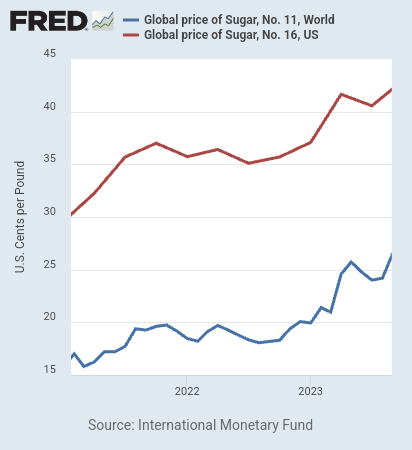Robert F. Kennedy Junior is reportedly going to mandate that Coca Cola start using cane sugar instead of High Fructose Corn Syrup in their drinks. Given that Bobby Jnr is a vaccine sceptic who was going to eat a dead bear cub he found on the road and at one point managed to get himself infested with a worm which ate part of his brain and then died I am not usually inclined to agree with him on health related matters. However, given that High Fructose Corn Syrup (HFCS) really is pretty nasty then he might just be onto something.
Unfortunately, such a move will drive up costs for the Coca Cola company and for consumers as these added costs are passed on and reflected in higher prices in stores. This is because the reason why Coca Cola uses HFCS rather than cane sugar is due to the policies of the US government.
In an attempt to protect domestic sugar producers the US slaps very high tariffs on imports of sugar. This means that sugar in the US is much more expensive in the US as the global price.
This is obviously good news if you’re an American sugar baron as producers in many other industries and households have very little choice but to buy your product. Of course some manufacturers will try and get around this by using a cheaper alternative. In the US this cheaper alternative comes in the form of HFCS which is so cheap thanks to the very generous subsidies to the US corn industry. As such, Coca Cola and other companies end up using this cheaper and unhealthier ingredient in their products which are then consumed by millions of Americans.
Hiking up prices for American companies and forcing them to use unhealthier ingredients were probably not the desired consequences of the policy makers who designed the sugar tariffs and the corn subsidies but they are the consequences.
This is always the case when it comes to subsidies. Not only are they incredibly expensive and money which could be spent on funding essential public services or put back into the pockets of taxpayers, they are also distortionary. It is unlikely that HFCS would be as readily available if it were not for corn subsidies but producers have to obviously produce a minimum amount of corn in order to receive the subsidies and so it incentivises them to grow more corn than they otherwise would.
Moreover, the land used to grow corn as a result of the subsidies could be used to produce different crops or another purpose entirely such as building homes or infrastructure. These alternatives would likely be more beneficial for the producers, other industries, consumers, the wider economy, and the environment.
It’s a similar issue with tariffs. While they may offer some protection to domestic producers they force up costs for other firms and consumers while also causing the ‘protected’ industries to become sluggish and unproductive and everyone is therefore poorer as a result.
In the US context phasing out agricultural tariffs and subsidies could allow American consumers to enjoy healthier and cheaper food and drinks. The UK should also phase out all agricultural tariffs and subsidies and start to import more food fro the rest of the world. Not only would this give UK households greater choice and more affordable food, it would also expose British farmers to more competition and force them to up their game and become more productive which would allow them to increase their profits and no longer be reliant on subsidies from taxpayers.
It will obviously be interesting to see how it all plays out with Bobby Kennedy Jnr with Trump and his drink of choice. What we do know is that scrapping agricultural tariffs and subsidies and embracing free trade brings huge economic benefits. Free trade: it’s the real thing!
Thanks as ever for reading. This is just a short post and I’ll likely write at least one other post this week.




